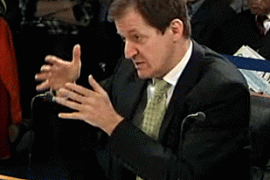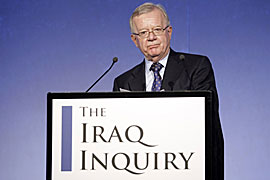Ex-Blair aide defends Iraq dossier
Alastair Campbell says document containing 45-minute weapons claim was “solid piece of work”.

Controversial dossier
Campbell described the dossier as a “cautious” assessment which was “owned” by the Joint Intelligence Committee (JIC), the body which directs the country’s national intelligence organisations.
| Related | ||
|
|
He said that in no way had Downing Street tried to “beef up or over-ride” the JIC’s judgements and that John Scarlett, the then chairman of the JIC, “was the person who, if you like, had the single pen”.
The dossier included a foreword by Blair in which he said he believed that the intelligence had established “beyond doubt” that Saddam had continued to manufacture weapons of mass destruction.
Scarlett told the inquiry last month that the foreword was “overtly political” and “quite separate” from the rest of the dossier.
The dossier sparked heavy criticism because of its claim that Saddam Hussein, the Iraqi leader at the time, could have nuclear weapons within a year and also the assertion that Iraq had chemical weapons that could be fired within 45 minutes.
Both claims were unfounded, with no weapons of mass destruction [WMD] uncovered inside Iraq after US-led forces toppled Saddam.
But the former communications chief blamed the inaccuracies on intelligence shortcomings rather than any mistakes by himself or Blair.
Peaceful resolution
Campbell also told the hearing that Blair had hoped for a peaceful resolution to the Iraq issue.
He said there never was a “precipitate rush to war” despite the close ties between Blair and George Bush, the US president at the time.
“You seem to be wanting me to say that Tony Blair signed up to say regardless of the facts, regardless of WMD, we are just going to get rid of the guy [Saddam],” he said. “It was not like that.”
But he added that it was clear throughout that if the diplomatic route didn’t work then the military option was evident.
Campbell is among the first major figures from Blair’s inner circle to give his version of events to the Iraq inquiry, the most wide-ranging investigation into the war thus far in Britain.
‘Close relationship’
The former aide began his three-hour evidence session by defending his close relationship with Blair.
 |
| John Chilcot, chairman of the inquiry, has insisted it will not be a whitewash [AFP] |
“If he asked me to jump off a building, I wouldn’t have done it, if he asked me to do anything silly or stupid, I wouldn’t have done it, but he never did,” he said.
Blair is due to appear in late January or early February, while Brown will not be called until after this year’s general election, which is expected to be held in May.
Campbell, Downing Street’s former director of communications and strategy, resigned in August 2003, the month after Dr David Kelly, a ministry of defence weapons expert, was found dead near his home with slashed wrists.
Earlier that year, Campbell fiercely denied a BBC report that he “sexed up” the Iraq dossier, and that he leaked the name of Dr Kelly as the source of the story.
‘Loyal supporter’
Commenting on Tuesday’s testimony, Andrew Gilligan, the reporter behind the “sexed up” claim, told Al Jazeera that Campbell had fiercely defended his former boss.
“Tony Blair has no more loyal supporter than Alastair Campbell,” Gilligan said.
“What we’ve seen for the rest of the inquiry in the last month or so, we’ve seen a whole succession of civil servants, diplomats, military people, subtly in some ways, not so subtly in others, dissing Tony Blair, dumping on him, saying they always had concerns that things weren’t handled right.
“Campbell was never going to do that, he’s extremely loyal to Blair, he would take a bullet for him.”
An official inquiry – one of several probes to which he has already given evidence over the Iraq war – subsequently exonerated him over the affair.
The ongoing inquiry, which started hearing testimony in late November, has faced criticism that it is not questioning witnesses rigorously enough.
Critics of the invasion had long demanded an investigation into whether the war, which was extremely unpopular among much of the British population, was illegal.
Many were disappointed when it was announced that the inquiry had no power to apportion blame or establish criminal or civil liability.
